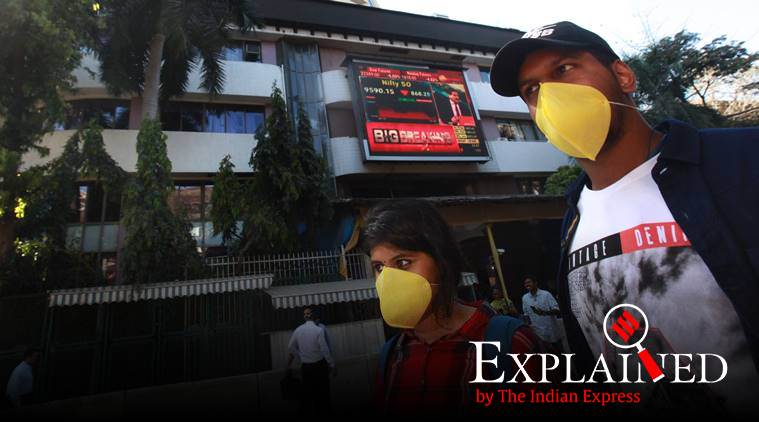Explained: As Indian markets fall, should you sell, hold or invest?
At a time when investors are witnessing sharp erosion in their wealth on account of fall in equity valuations, market participants say the bottom line is not known.
 The fall began in January when China reported a sharp rise in cases of the coronavirus infection. (Express Photo by Pradip Das)
The fall began in January when China reported a sharp rise in cases of the coronavirus infection. (Express Photo by Pradip Das)
The BSE Sensex witnessed the second-biggest single-day fall in its history on Thursday, as it fell by 8.2 per cent, just lower than the 11 per cent fall seen on October 24, 2008.
The fall began in January when China reported a sharp rise in cases of the coronavirus infection. This has resulted in a 21.8 per cent fall in the Sensex since January 17, when it closed at 41,945. As the virus spread in Europe, the US and India widened in March, the Sensex lost 14.4 per cent this month, to date. Sensex crashes over 3,000 points in opening trade on Friday
At a time when investors are witnessing sharp erosion in their wealth on account of fall in equity valuations, market participants say the bottom line is not known. The question arises is what should the investor do — exit the market, stay put or keep investing?
Why are the markets falling?
The scare is primarily driven by the spread of coronavirus around the world, loss of lives across countries and its economic impact.
As countries are restricting entry by virtually locking their borders, the scare is only mounting by the day. The sharp fall in equity markets worldwide and crash in the crude oil prices (trading at $33.76 per barrel as of 1:05 PM EDT) has forced investors worldwide to look for safe havens and safer asset classes.
In India, in just eight trading days of March, foreign portfolio investors have sold equities worth a net of Rs 26,449 crore. Market participants say the fall in India is primarily driven by the panic button pressed by the FPIs and they are in a sell mode.
On the quantum of fall fund, managers say since the selling intensity is very high among FPIs, buyers are quoting lower levels and that is pulling down the markets sharply.
How much can it fall?
This is one question for which no one has an answer. “It will depend on if and when the world finds a medical solution to contain the virus,” said Nilesh Shah, MD of Kotak Mahindra AMC. So, while, there is no bottom line to the market under the current circumstances, many feel that the markets will start recovering once a medical solution is available. However, that may be a week, a month or six months away.
How are domestic investors behaving?
It is important to note that even as the markets are falling and there is a scare, investors are behaving in a much mature manner. Fund managers say the behaviour is in sharp contrast to what was seen in 2008-09 during the financial crisis, when investors rushed to sell their equity holdings.
In fact, even as FPIs have rushed to sell their holdings worth Rs 26,449 crore, over the last eight trading sessions, domestic institutional investors have put in a net of Rs 21,817 crore, thereby making up for almost 82 per cent of FPIs’ outflow.
📢 Express Explained is now on Telegram. Click here to join our channel (@ieexplained) and stay updated with the latest
Mutual funds players say they have not seen redemption by investors. “As of Wednesday, data shows that there have been positive inflows and investors are not selling,” said Nimesh Shah, MD & CEO of ICICI Prudential AMC.
Even Nilesh said his fund house has seen continuous inflow through systematic investment plans and also through the non-SIP mode.
What should investors do?
With the markets already down over 20 per cent in the last one month, investors should avoid selling their stocks or mutual fund holding under panic as they would book losses in a hurry. It is best to stay put and wait for the event to play out.
“I don’t know what the bottomline is and when the market will hit that. It may take 2-3 months or more. But, the valuations are attractive and if one enters the market with a 3 year view, I think it will be a good experience,” said Nimesh Shah.
Don’t miss from Explained | WHO declares coronavirus a pandemic. What does this mean?
Kotak’s Nilesh said once the medical solution is found, India will benefit on various accounts — lower crude oil prices, reduction in trade deficit with China, lower interest rates and companies looking to diversify away from China. “Bear the current pain, but once the solution is found to the virus, things will start improving.
It is important to note that during the global financial crisis in 2008, while the Sensex lost 36 per cent in the one-month period between September 24, 2008 and October 24, 2008, it regained its lost ground and reached the levels seen on September 24, 2008 seven month later in May 2009.
- 01
- 02
- 03
- 04
- 05






































